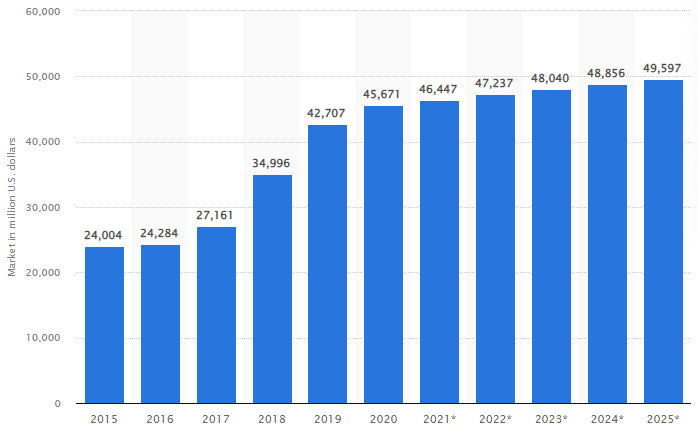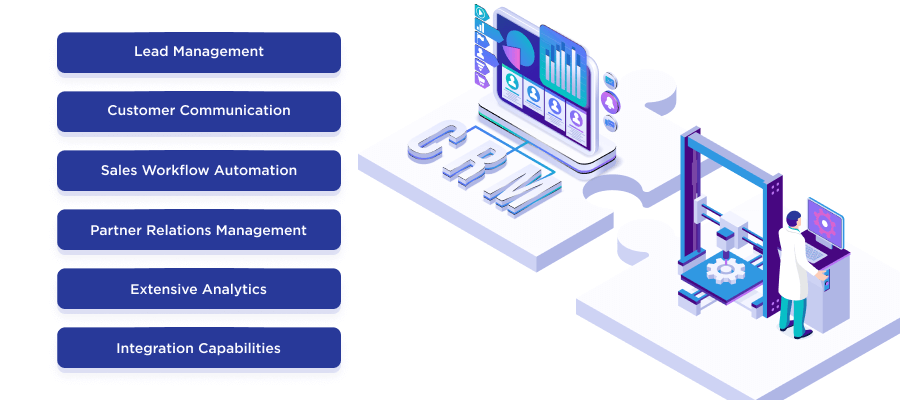Regardless of the industry you operate in, understanding the needs and preferences of your customers is imperative. After all, it’s the only way to truly optimize your offer in a way that will get them to make a purchase and stay loyal to your organization.
To achieve that high level of understanding, many companies are relying on customer relationship management (CRM) solutions. So much so in fact, the global CRM software market is forecasted to grow to $49.6 billion by 2025. The numbers tell us there’s a promising future and great potential to leverage.

In an industry as dynamic and complex as manufacturing, having a system that can help effectively support relationships with customers, dealers, distributors, and other partners is of utmost importance.
Hence, in today’s post, we will discuss the main benefits of a CRM for manufacturing companies. Additionally, we will cover the key features you should be on the lookout for when pursuing CRM implementation services.
6 Key Features of Manufacturing CRM Software
CRM solutions for manufacturers may come with various types of features and add-ons. However, there are a couple of must-have functions that should be kept in mind when you set out to develop your tool.

1. Lead Management
First and foremost, your manufacturing CRM should facilitate smooth lead management. Specifically, it needs to provide the opportunity to seamlessly move any incoming requests through the sales pipeline. Leads should be converted into customers through qualification, lead scoring, and proper nurturing.
With the help of an effective lead management feature, your sales team will be able to quickly determine which contacts should be prioritized in order to drive productivity and close more deals.
Moreover, if you choose to enhance your solution with artificial intelligence, it will have the ability to generate recommendations for upselling, cross-selling, and offering additional services to suitable leads. Thus, raising the average check and reflecting positively on the bottom line.
Discover the Top 5 Ways a CRM Improves Lead Generation
2. Customer Communication
Of course, one of the central aspects of any CRM solution is the facilitation of communication with customers. In the modern world, there are multiple channels through which clients can be reached. Emails, chats, phone calls, social media messages — there is a seemingly endless number of potential connection points that all need to be tracked.
With the help of a CRM, everything becomes easier. It provides manufacturers with a unified customer view that displays interaction history and relevant personal details. Plus, it allows for centralized multichannel communication so that you can send a follow-up email, place a call, or respond to a text message all from one place.
Gaining Control of Customer Engagements
What if every customer could deal with your single most effective sales or service person?
3. Sales Workflow Automation
Another important function of CRM software in manufacturing is sales workflow automation. In short, this means that any repetitive tasks your sales employees spend time on can be eliminated. Thus, allowing them to focus on more meaningful activities.
Automation is typically achieved through the creation of workflows that trigger an action to be carried out or a reminder to be sent to an employee. For example, if a prospect doesn’t respond to your email within a few days — a follow-up that has been precomposed can be sent at the specified time to make sure nothing falls through the cracks.
Find out how we Automated the Sales Process for a Car Dealer
4. Partner Relations Management
As we’ve briefly mentioned, a CRM doesn’t exist to solely keep track of customer interactions. It can also be used to manage relationships with channel partners like distributors, dealers, and so on.
Specifically, a partner relations management feature should help manufacturers maintain straightforward communication with their associates, keep track of relevant documents, and facilitate collaboration. For instance, some companies choose to develop an entire partner portal in order to allow for quick and easy information and content exchanges.
5. Extensive Analytics
Naturally, a CRM designed for a manufacturer isn’t complete if it doesn’t support thorough analytics. After all, you’ve got to see how your sales and marketing activities are performing and whether some strategies need to be adjusted.
Typically, your CRM should be able to monitor sales and revenue levels, the efficiency of your agents, marketing campaign results, and even customer demand forecasts so that production planning can be more accurate. Lastly, it’s important for the platform to have customizable dashboards and a reporting function in order to simplify the analysis process.
6. Integration Capabilities
Finally, the last must-have CRM feature that we’ll discuss today is integration capabilities. As a manufacturer, you might already have multiple solutions that are helping you run your business. Naturally, you need them to work together for optimal efficiency.
ERP systems, CPQ software, supply chain platforms, business intelligence tools, MRP programs, and contact center solutions should all be able to seamlessly connect with your CRM for a better view of performance. That way, you’ll be able to avoid potential data silos and truly leverage all the information you have on hand.
Discover how Velvetech Integrated a CRM With Accounting Software
Benefits of Using a CRM for Manufacturing Business
Now that we’ve covered the features that a CRM for manufacturers should have, it’s time to look at the specific benefits that you’ll observe from implementing this software.

Unified Customer and Partner View
With a good CRM, you get a 360° customer and partner view that basically provides complete insights into their most important information. No matter which department interacted with a client or partner last, you’ll be able to see exactly what occurred. Naturally, this simplifies the information exchange process and allows for creating more consistent and personalized experiences.

Better Engagement With Contacts
Thanks to the highly detailed customer records and analytics that a manufacturing CRM can provide, you will be able to engage with your customers on a new level. By knowing their unique behavioral patterns, you’ll have the opportunity to tailor sales and marketing campaigns for higher chances of success.

Streamlined Sales Processes
By automating sales workflows with the help of triggered actions, you can significantly reduce the amount of time and other resources spent on nurturing leads and maintaining regular contact with them. Moreover, with the help of intelligent lead scoring, your teams can prioritize the leads that are most likely to convert. Thus, driving higher sales while spending less time on repetitive work.
Find out more about CRM Best Practices for Boosting Sales
Does Your Manufacturing Company Need a Custom CRM?
If everything we have discussed above has convinced you that it’s time for your manufacturing company to implement a CRM, then there’s just one more point that needs to be considered. Is a custom tool or a ready-made solution like the Creatio CRM or Microsoft Dynamics 365 the right fit for you?
To answer this question, you’ve got to think about your unique requirements. After all, every manufacturing company is different and CRMs also don’t come in identical shapes and sizes. To help you figure it out, take a look at the following signs that are a good indication that custom software, or an off-the-shelf product but with extensive tailoring capabilities, is the best option for you:
- You have a very large number of users requiring access to the software, which makes licensing fees of prebuilt tools very high.
- Your manufacturing area calls for high levels of regulatory compliance and data security.
- You need specific tailored features that ready-made solutions do not have.
- You have multiple complex enterprise systems that the CRM needs to integrate with.
If the above scenarios apply to you, it’s probably a good idea to look into custom development. Or, consider an off-the-shelf solution, but one that allows for some major feature additions and CRM customization in order to fit your needs.
Learn more about the Benefits of Custom Software Development
Getting the Right CRM for Your Manufacturing Needs
A CRM is excellent for helping manufacturers manage their customer and partner relationships, optimizing the sales process, elevating the quality of services, and boosting productivity. That’s why more and more companies are embracing this software and implementing it into their organizations.
So, if you are looking to improve sales and marketing initiatives and streamline the related workflows — don’t hesitate to reach out to Velvetech. Our team has years of experience in CRM software implementation and customization. We’d be happy to consult you on the type of solution that might best fit your needs and help you achieve your goals.










